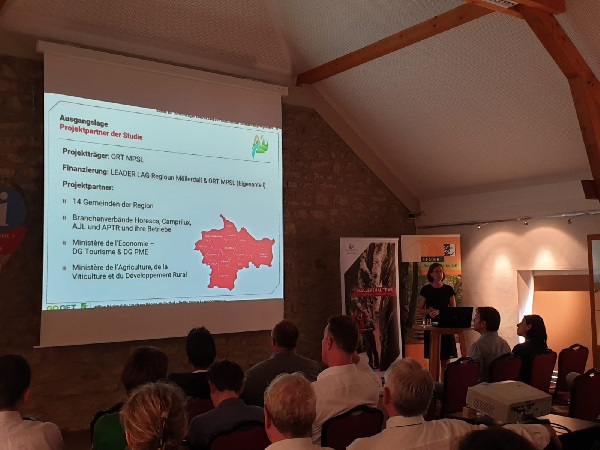 Credit: Mullerthal regional tourism office
Credit: Mullerthal regional tourism office
A recent study on tourist accommodation in the Mullerthal region has shown that more than 70% of regional accommodation providers must settle their estate and thus change the ownership of their establishments over the next five years.
The "Study on the medium-term development of the offer of tourist accommodation in the Mullerthal Region - Luxembourg's Little Switzerland" focused on the following key question: "In which direction is the accommodation offer in the Mullerthal Region - Luxembourg's Litte Switzerland in the medium term?". Presented at the weekend at the Heringer Millen tourism office, the study was carried out within the framework of the LEADER project of the same name and implemented by the regional Mullerthal tourism office, in cooperation with the consulting firm GO GET Consulting.
The idea of the study emerged from the fact that the number of overnight stays in the Mullerthal region has been increasing every year since 2012 and yet, in the last 20 years, as in many rural areas living from leisure tourism and seasonal tourism, about 50% of accommodation capacity has disappeared. The aim was thus to get a snapshot of the current situation, allowing for a more precise definition of deficits and potentials and the ability to develop appropriate measures.
According to Minister of Agriculture, Viticulture and Rural Development, Romain Schneider, who was present at the presentation of the study's results: "Through its bottom-up approach and public-private partnerships, LEADER is successfully implementing improvements for rural residents. Thus, tourism in the Mullerthal Region has been able to generate significant added value thanks to the innovative LEADER projects of recent years" .
As part of this study, 92 interviews were conducted with tourist accommodation operators, communal representatives, experts and representatives of professional associations. The focus was on medium-term development of housing capacity, succession planning, competitiveness and development potential.
The interviews revealed that in all categories of accommodation (hotels, campsites and holiday apartments), many generation changes are imminent. More than 70% of regional hosting providers must settle their estate over the next five years. In the current context of strong competition in the housing and labour market, as well as in the face of limited profitability, companies whose succession has not yet been settled are particularly vulnerable to closures which would in turn damage the tourist industry in Luxembourg.
The study also showed in great detail that a business succession is a multilevel process that requires time, resources and willingness to discuss successors. In addition to the financial, legal, tax and commercial aspects, the personal and human aspects play a crucial role. In the Mullerthal region, nearly 20% of the total number of companies have successfully completed succession in the last three years (seven hotels, six campsites and five apartments), including the Trail-Inn hotel, the Berdorfer Eck apartments and a new Brimer family project in Grundhof.
On this occasion, Minister of Tourism and Middle Classes, Lex Delles, stressed that investments in accommodation establishments are crucial to ensure that they develop constantly and adapt to customer expectations. To this end, the Ministry provides concrete assistance: "State aid must be adapted to the needs of small and medium-sized enterprises". In addition, Minister Delles emphasised the fact that in the coming years considerable efforts will be made, in close collaboration with the regional tourism offices, Luxembourg for Tourism (LFT) and the Luxembourg Convention Bureau (LCB), in order to improve the framework conditions for tourism. "For example, we planned to create a digital tourist application, with additional services such as a route planning tool for cyclists and hikers. Better service provision at the national level is not only beneficial for tourists and residents, but also for all stakeholders in the tourism sector".








